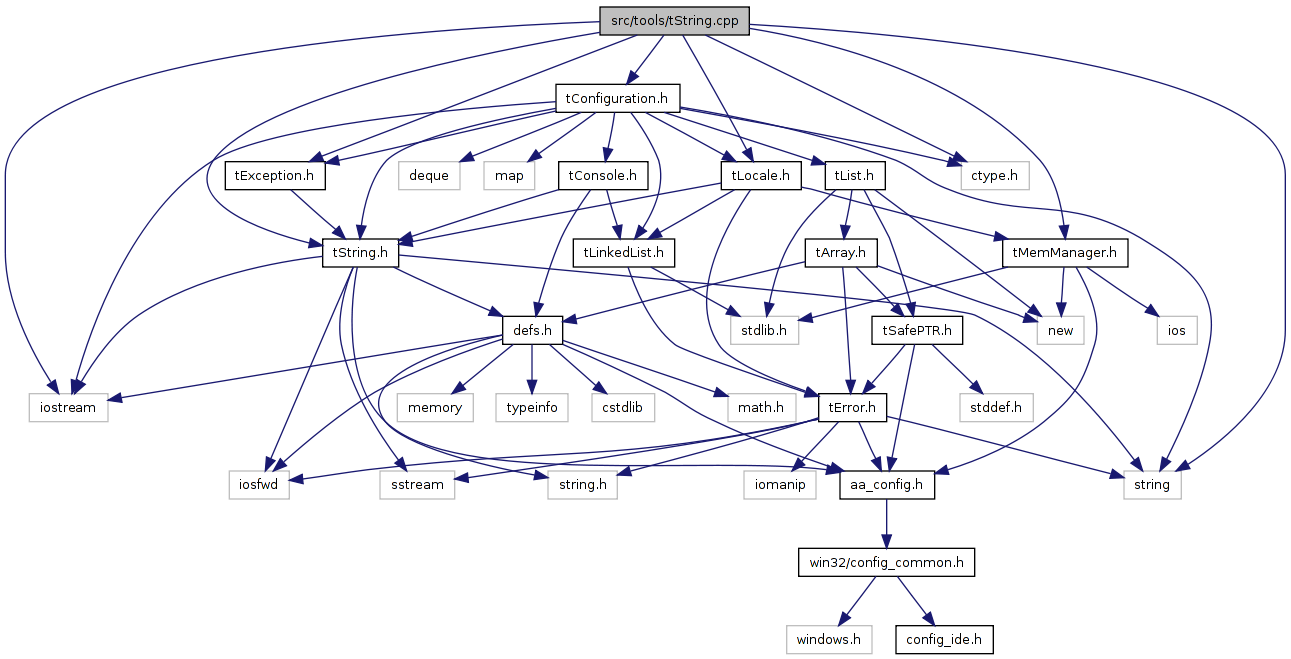
#include "tMemManager.h"#include "tString.h"#include "tLocale.h"#include "tConfiguration.h"#include "tException.h"#include <ctype.h>#include <string>#include <iostream>

Go to the source code of this file.
Classes | |
| class | tCharacterFilter |
Functions | |
| static bool | st_ReadEscapeSequence (char &c, char &c2, std::istream &s) |
| static bool | st_ReadEscapeSequence (char &c, std::istream &s) |
| std::istream & | operator>> (std::istream &s, tString &x) |
| stream reading operator honoring escape sequences and quoting | |
| template<class T> | |
| void | ToT (tString const &source, T &target, tString::size_type pos, char const *name) |
| static int | GetInt (const tString &s, int &pos) |
| static int | RemoveTrailingColor (tString &s, int maxLen=-1) |
| static int | RTC (REAL x) |
| static char | int_to_hex (int i) |
| tColoredString & | operator<< (tColoredString &s, const tColoredStringProxy &colorCode) |
| string building streaming operator | |
| std::stringstream & | operator<< (std::stringstream &s, const tString &t) |
| bool | tIsInList (tString const &list_, tString const &item) |
| check whether item is in a comma or whitespace separated list | |
| void | tToLower (tString &toTransform) |
| converts a string to lowercase | |
| void | tToUpper (tString &toTransform) |
| converts a string to uppercase | |
Variables | |
| static tString | delimiters ("!?.:;_()-, ") |
| static tConfItemLine | st_wordDelimiters ("WORD_DELIMITERS", delimiters) |
| bool | st_colorStrings = true |
| static tConfItem< bool > | cs ("COLOR_STRINGS", st_colorStrings) |
| static char | hex_array [] = "0123456789abcdef" |
| static int GetInt | ( | const tString & | s, | |
| int & | pos | |||
| ) | [static] |
Definition at line 833 of file tString.cpp.
References tString::Len().
Referenced by tString::CompareAlphaNumerical().
00834 { 00835 int ret = 0; 00836 int digit = 0; 00837 while ( pos < s.Len() && digit >= 0 && digit <= 9 ) 00838 { 00839 ret = ret*10 + digit; 00840 digit = s[pos] - '0'; 00841 pos++; 00842 } 00843 00844 if ( ret > 0 ) 00845 { 00846 return ret + 0x10000; 00847 } 00848 else 00849 { 00850 return digit + '0'; 00851 } 00852 }


| static char int_to_hex | ( | int | i | ) | [static] |
Definition at line 1675 of file tString.cpp.
01675 { 01676 if (i<0 || i >15) 01677 return 'Q'; 01678 else 01679 return hex_array[i]; 01680 }
| std::stringstream& operator<< | ( | std::stringstream & | s, | |
| const tString & | t | |||
| ) |
Definition at line 1852 of file tString.cpp.
01853 { 01854 static_cast<std::ostream&>(s) << static_cast<const char *>(t); 01855 return s; 01856 }
| tColoredString& operator<< | ( | tColoredString & | s, | |
| const tColoredStringProxy & | colorCode | |||
| ) |
string building streaming operator
Appends a color code to a colored string
| s | the string to append to | |
| colorCode | the colorcode to append |
Definition at line 1694 of file tString.cpp.
References tColoredStringProxy::b_, cs, tColoredStringProxy::g_, int_to_hex(), tColoredStringProxy::r_, and RTC().
01695 { 01696 if (st_colorStrings) 01697 { 01698 char cs[9]; 01699 cs[0]='0'; 01700 cs[1]='x'; 01701 01702 int RGB[3]; 01703 RGB[0]=RTC(colorCode.r_); 01704 RGB[1]=RTC(colorCode.g_); 01705 RGB[2]=RTC(colorCode.b_); 01706 01707 for(int i=0;i<3;i++){ 01708 int lp=RGB[i]%16; 01709 int hp=(RGB[i]-lp)/16; 01710 cs[2+2*i]=int_to_hex(hp); 01711 cs[2+2*i+1]=int_to_hex(lp); 01712 } 01713 cs[8]=0; 01714 01715 s << cs; 01716 } 01717 01718 return s; 01719 }

| std::istream& operator>> | ( | std::istream & | s, | |
| tString & | x | |||
| ) |
stream reading operator honoring escape sequences and quoting
| s | stream to read from | |
| x | string to read to |
Definition at line 111 of file tString.cpp.
References c, tString::Clear(), isblank(), and st_ReadEscapeSequence().
00112 { 00113 x.Clear(); 00114 00115 std::ws(s); 00116 00117 char c=s.get(); 00118 00119 // check if the string is quoted 00120 bool quoted = false; 00121 char quoteChar = c; // if it applies, this is the quoting character 00122 if ( c == '"' || c == '\'' ) 00123 { 00124 // yes, it is 00125 quoted = true; 00126 c = s.get(); 00127 } 00128 00129 while((quoted || !( isblank(c) || c == '\n' || c == '\r' ) ) && s.good() && !s.eof()){ 00130 x += c; 00131 c=s.get(); 00132 00133 // read and interpret escape sequences 00134 if ( !st_ReadEscapeSequence( c, s) ) 00135 { 00136 // interpret special characters 00137 if ( quoted && c == quoteChar ) 00138 { 00139 // this marks the end of a quoted string; abort. 00140 c = s.get(); 00141 break; 00142 } 00143 } 00144 else if ( isblank( c ) ) 00145 { 00146 // include escaped spaces 00147 x += c; 00148 c=s.get(); 00149 } 00150 00151 } 00152 s.putback(c); 00153 return s; 00154 }
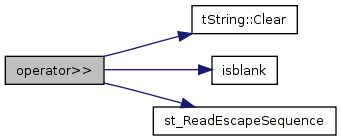
| static int RemoveTrailingColor | ( | tString & | s, | |
| int | maxLen = -1 | |||
| ) | [static] |
Definition at line 1562 of file tString.cpp.
References tString::SetSize(), and tString::Size().
01563 { 01564 // count bytes lost to color codes 01565 int posDisplacement = 0; 01566 int len = 0; 01567 01568 // walk through string 01569 for ( size_t g=0; g+1 < s.Size(); g++) 01570 { 01571 if (s(g) == '0' && s(g+1) == 'x') 01572 { 01573 // test if the code is legal ( not so far at the end that it overlaps ) 01574 if ( s.Size() >= g + 8 ) 01575 { 01576 // everything is in order, record color code usage and advance 01577 posDisplacement+=8; 01578 g+=7; 01579 } 01580 else 01581 { 01582 // illegal code! Remove it. 01583 s.SetSize( g ); 01584 // s[g]=0; 01585 } 01586 } 01587 else if ( maxLen > 0 ) 01588 { 01589 if ( ++len >= maxLen ) 01590 { 01591 // maximal end reached, cut it off 01592 s.SetSize( g-1 ); 01593 // s[g]=0; 01594 } 01595 } 01596 } 01597 01598 return posDisplacement; 01599 }

| static int RTC | ( | REAL | x | ) | [static] |
Definition at line 1664 of file tString.cpp.
Referenced by operator<<().
01664 { 01665 int ret=int(x*255); 01666 if (ret<0) 01667 ret=0; 01668 if (ret>255) 01669 ret=255; 01670 return ret; 01671 }

| static bool st_ReadEscapeSequence | ( | char & | c, | |
| std::istream & | s | |||
| ) | [static] |
Definition at line 89 of file tString.cpp.
References st_ReadEscapeSequence().
00090 { 00091 char c2 = '\0'; 00092 bool ret = st_ReadEscapeSequence( c, c2, s ); 00093 if ( c2 ) 00094 s.putback( c2 ); 00095 return ret; 00096 }

| static bool st_ReadEscapeSequence | ( | char & | c, | |
| char & | c2, | |||
| std::istream & | s | |||
| ) | [static] |
Definition at line 47 of file tString.cpp.
Referenced by operator>>(), tString::ReadLine(), and st_ReadEscapeSequence().
00048 { 00049 c2 = '\0'; 00050 00051 // detect escaping 00052 if ( c == '\\' && !s.eof() && s.good() ) 00053 { 00054 c2 = s.get(); 00055 00056 // nothing useful read? 00057 if ( s.eof() ) 00058 { 00059 c2 = 0; 00060 return false; 00061 } 00062 00063 // interpret special escape sequences 00064 switch (c2) 00065 { 00066 case 'n': 00067 // turn \n into newline 00068 c = '\n'; 00069 c2 = 0; 00070 return true; 00071 case '"': 00072 case ' ': 00073 case '\'': 00074 case '\n': 00075 // include quoting character as literal 00076 return true; 00077 default: 00078 // take the whole \x sequence as it appeared. 00079 return false; 00080 } 00081 } 00082 00083 return false; 00084 }
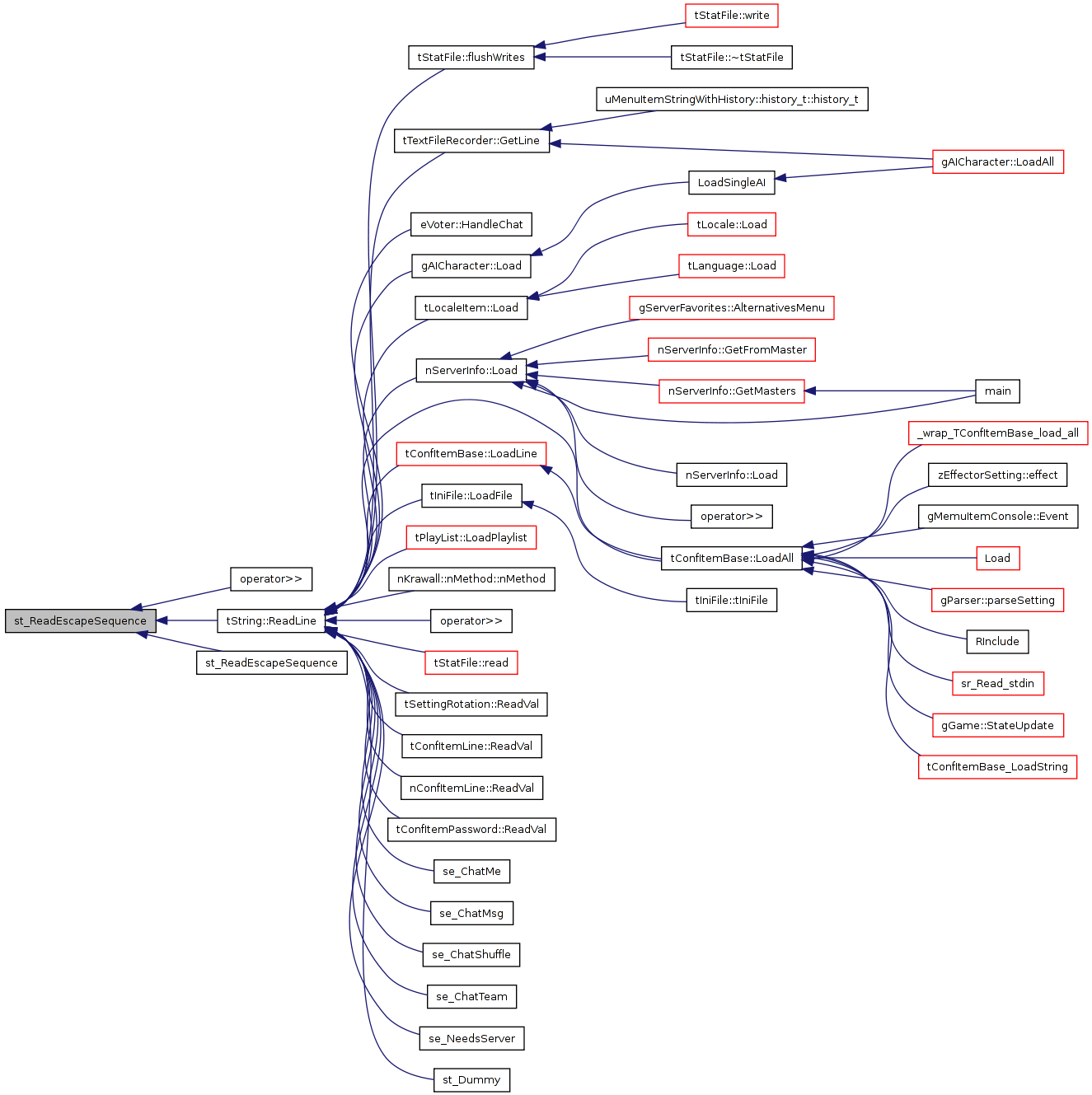
check whether item is in a comma or whitespace separated list
| list | The string representation of the list | |
| item | The item to look for |
Definition at line 2166 of file tString.cpp.
References isblank(), tString::Len(), pos, tString::StrPos(), and tString::SubStr().
Referenced by sn_BothHave(), and sn_GetSupportedMethods().
02167 { 02168 tString list = list_; 02169 02170 while( list != "" ) 02171 { 02172 // find the item 02173 int pos = list.StrPos( item ); 02174 02175 // no traditional match? shoot. 02176 if ( pos < 0 ) 02177 { 02178 return false; 02179 } 02180 02181 // check whether the match is a true list match 02182 if ( 02183 ( pos == 0 || list[pos-1] == ',' || isblank(list[pos-1]) ) 02184 && 02185 ( pos + item.Len() >= list.Len() || list[pos+item.Len()-1] == ',' || isblank(list[pos+item.Len()-1]) ) 02186 ) 02187 { 02188 return true; 02189 } 02190 else 02191 { 02192 // no? truncate the list and go on. 02193 list = list.SubStr( pos + 1 ); 02194 } 02195 } 02196 02197 return false; 02198 }
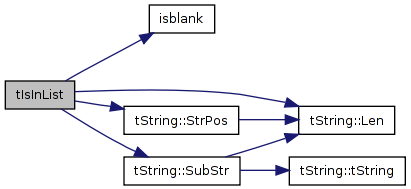

| void ToT | ( | tString const & | source, | |
| T & | target, | |||
| tString::size_type | pos, | |||
| char const * | name | |||
| ) | [inline] |
Definition at line 775 of file tString.cpp.
References tString::Convert(), and tString::Size().
Referenced by tString::ToFloat(), and tString::ToInt().
00776 { 00777 if ( pos > source.Size() ) 00778 pos = source.Size(); 00779 00780 if ( !source.Convert( target, pos ) ) 00781 { 00782 std::ostringstream message; 00783 00784 if ( pos > 0 ) 00785 { 00786 message << "Expected an " << name << " at position " << pos << " of string \"" << source << "\", but got \"" << static_cast<tString::CHAR const *>(source) + pos << "\"."; 00787 } 00788 else 00789 { 00790 message << "Expected an " << name << ", but got \"" << source << "\"."; 00791 } 00792 throw tGenericException( message.str().c_str(), "Conversion Error" ); 00793 } 00794 }


| void tToLower | ( | tString & | toTransform | ) |
converts a string to lowercase
| toTransform | The string to transform |
Definition at line 2209 of file tString.cpp.
References tString::Len().
Referenced by eVoter::HandleChat(), nKrawall::nMethod::nMethod(), tConfItemBase::tConfItemBase(), and uAction::uAction().
02210 { 02211 for( int i = toTransform.Len()-2; i >= 0; --i ) 02212 { 02213 toTransform[i] = tolower( toTransform[i] ); 02214 } 02215 }

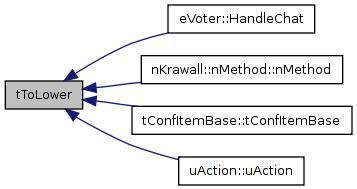
| void tToUpper | ( | tString & | toTransform | ) |
converts a string to uppercase
| toTransform | The string to transform |
Definition at line 2226 of file tString.cpp.
References tString::Len().
Referenced by tConfItemBase::LoadLine(), and s_Veto().
02227 { 02228 for( int i = toTransform.Len()-2; i >= 0; --i ) 02229 { 02230 toTransform[i] = toupper( toTransform[i] ); 02231 } 02232 }


tString delimiters("!?.:;_()-, ") [static] |
Referenced by tString::PosWordRight().
char hex_array[] = "0123456789abcdef" [static] |
Definition at line 1673 of file tString.cpp.
| bool st_colorStrings = true |
Definition at line 1660 of file tString.cpp.
tConfItemLine st_wordDelimiters("WORD_DELIMITERS", delimiters) [static] |
 1.5.4
1.5.4